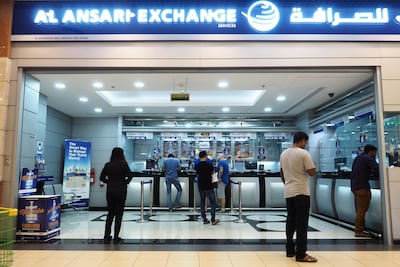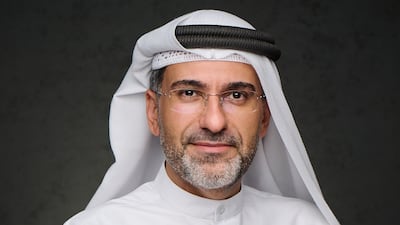Geopolitical stability in the region and oil prices will help drive the growth of remittances as they reduce currency fluctuations and support economic development, according to Rashed Al Ansari, group chief executive of Al Ansari Financial Services.
This will drive higher expenditure by governments and investors, which will increase population growth in the region and “directly impact our line of business”, he told The National in an interview.
“The geopolitical situation in the region has had an impact on our wholesale business. Although a boom in UAE tourism helped drive foreign currency sales, we have seen some reduction in the supply of foreign currency to banks around the region because of geopolitical tensions and exchange rate fluctuations,” Mr Al Ansari said.
However, a strengthening US dollar, mainly due to the new Donald Trump administration, has supported remittances due to the difference between the greenback and currencies in countries customers remit money to.
The dollar has strengthened against the Indian rupee, Pakistani rupee and Filipino peso. That’s the demographic that sends money regularly back home. This offered a lot of purchasing power to these consumers, he added.
The demographics of the UAE, with expatriates constituting 88 per cent of the population, are seen as directly proportional to the volume of personal outward remittances. The Emirates ranked second globally for sending international remittances after the US, followed by Saudi Arabia in third place, during 2023, according to the World Bank.
In the same year, personal outward remittances in the UAE reached about Dh134 billion, which averages around Dh11 billion on a monthly basis.
The UAE’s demographics is continuously changing and transitioning to a knowledge-based economy, Mr Al Ansari said.
“Many expats are coming here, staying longer, establishing a family and calling the UAE home, which shifts the labour force from domestic workers to a white-collar base. That affects the volume of remittance transactions,” he explained.
“With white-collar workers, they are more educated and understand currency trends. Instead of remitting on a monthly basis, they wait to see the exchange rate and then remit a large chunk of money.”
There has been a growth in remittances due to the surge in the UAE’s population, but the existence of parallel channels could have affected the numbers, he pointed out. Data from the UAE Central Bank showed a 3 per cent decline in remittances last year.
The UAE’s demographic mix has not changed. Indians remit the most money, followed by Pakistanis, Filipinos and Egyptians.
“But we have noticed some increase in the Pakistani corridor, because they offer the Pakistan Remittance Initiative. It was launched in 2009 to move people from unofficial channels into official channels and has worked very well. Specifically last year, once the parallel market subsided, people came back much quicker into official channels than other corridors,” Mr Al Ansari said.

Challenges
The increase in interest rates over the past couple of years has resulted in some countries having less availability of dollars because of the pressures on their economies, according to the senior executive.
This has created a parallel market – people sending money through unofficial channels – and that has impacted remittances to an extent, but the trend has subsided. For example, in Egypt, once they decided to float their currency, the parallel market almost disappeared, he said.
Citing the challenge posed by FinTechs, Mr Al Ansari said exchange houses welcome competition, but they want it to be fair and a level playing field.
Although a lot of FinTechs have established in free zones and provide services on the mainland, they are not licensed by the Central Bank of the UAE, only by the free zone regulator.
“They don’t realise that you need to be licensed by the central bank to provide services in dirhams. These FinTechs also do not offer an innovative solution or a revolutionary customer journey, instead they opt for predatory pricing. They start offering free remittances and even reward the customer with Dh50 to register on their platform and give them the service for free,” he said.
“That is not sustainable for the organisation or the country in general, they are violating the laws of the land and not contributing to Emiratisation, too. They're not contributing to creating jobs or to the UAE tax regime. They also pose a risk to consumers.”
Al Ansari Exchange is working closely with the central bank, Ministry of Economy and free zones to educate them so they can enhance their regulatory regime. The group chief executive said he hopes to see some changes in regulations this year to prevent such violations by FinTechs.
However, he said that his company, “despite being a market leader”, was open to collaborate with a FinTech that offers a technology that will reduce costs, is more efficient and has a superior user interface.
group chief executive, Al Ansari Financial Services
Compliance costs
Regulatory compliance has an impact on the remittance business. Companies now need more manpower to go through all transactions “with a fine-tooth comb”, according to Mr Al Ansari.
“We have a lot of costs associated with compliance. The UAE being removed from the Financial Action Task Force’s grey list in 2024 was great news and shows that it’s compliant with international best practices when it comes to financial services across the board,” he said.
“The younger generation wants everything to be real time. That poses a challenge, because although we have the capability to do a transaction in real time, the regulation requires us to do a lot of checks and balances that will stop those transactions for a period of time, depending on the risk associated with a country or a customer profile. There's always a push and pull between compliance and business and consumer expectations.”
Digital transactions
The digitisation trend for remitting money accelerated after the Covid-19 pandemic, not only in the UAE but also globally. People find it more convenient to use technology and they trust it more, Mr Al Ansari said.
Before the pandemic, less than 1 per cent of the exchange house’s remittance business was through digital channels. Six months into the pandemic, this jumped to 15 per cent. In the first nine months of last year, 24 per cent of its remittances took place through its digital channel, he explained.
About 11 per cent of outward cross-border remittances are happening through digital channels across the UAE, he added.
There is a high smartphone penetration among the UAE’s labour class and domestic workers, mainly because it’s a cheap way of communicating back home. Exchange houses benefit from this because they use smartphones as a platform to provide services to them, he added.




